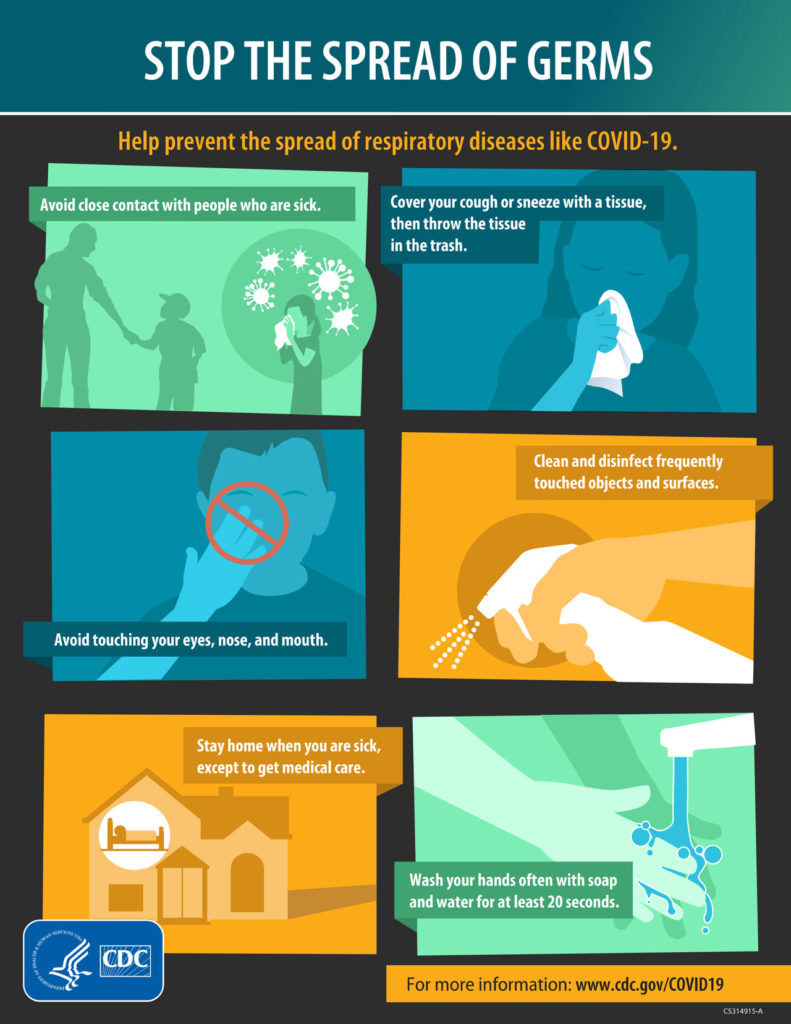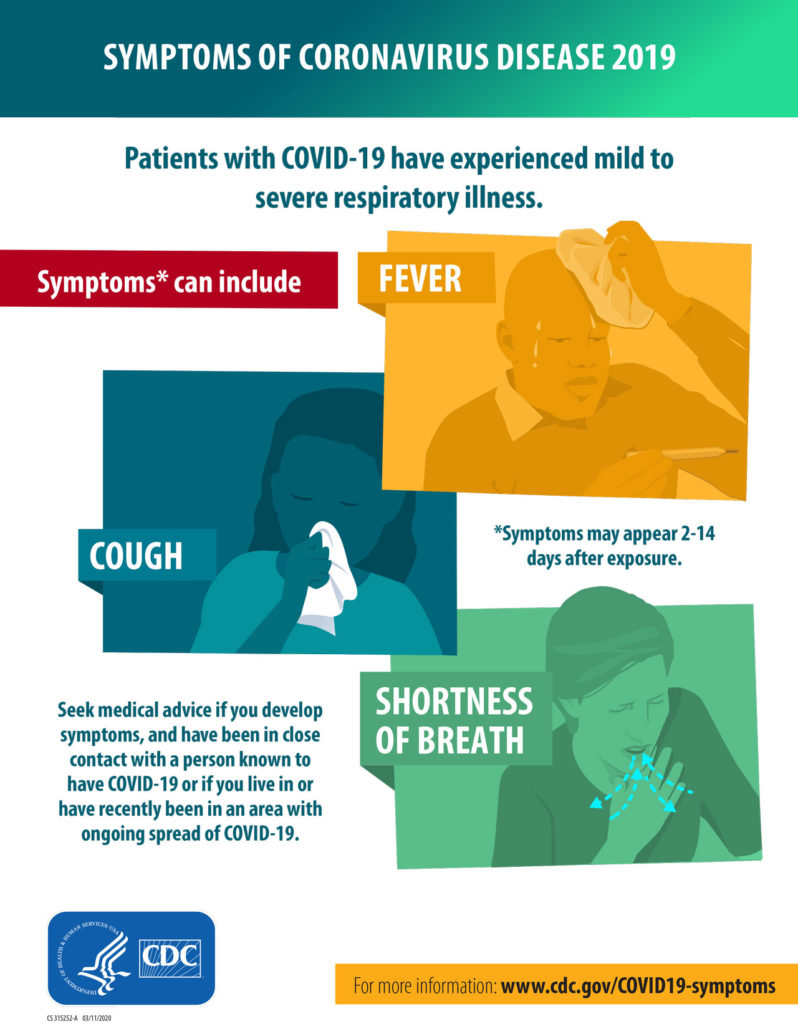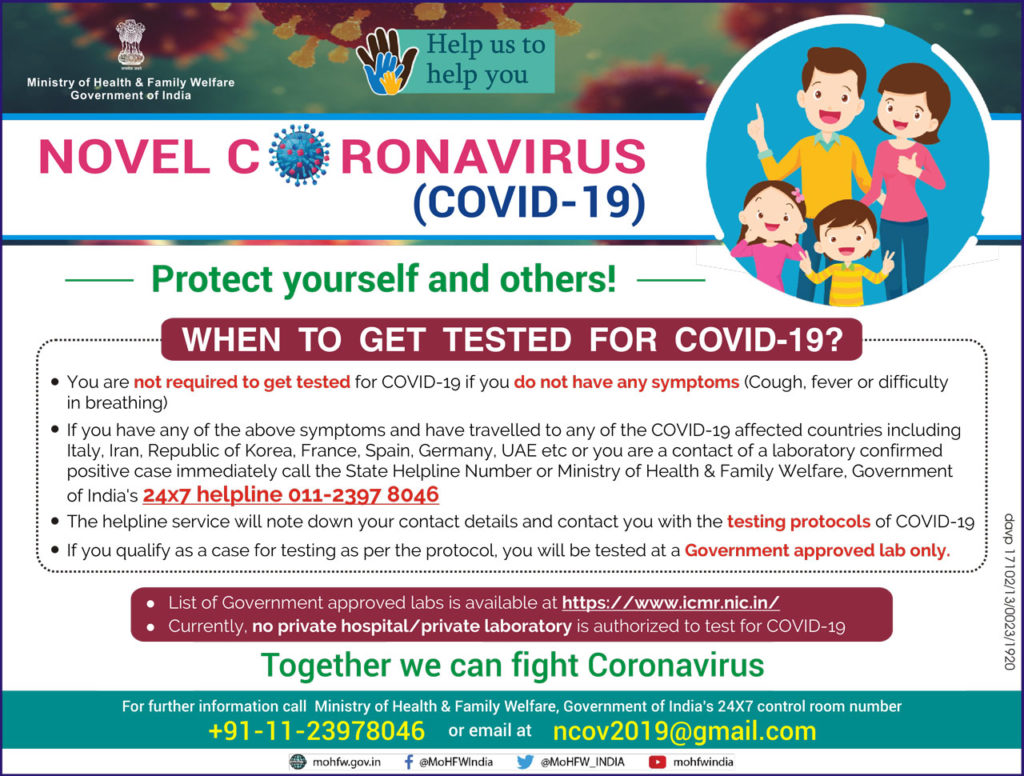Prevention of Coronavirus Disease 2019 (COVID-19)
What can people do to protect themselves and others from getting the new coronavirus?
Basic protective measures against the new coronavirus
Stay aware of the latest information on the COVID-19 outbreak, available on the WHO website and through your national and local public health authority. COVID-19 is still affecting mostly people in China with some outbreaks in other countries. Most people who become infected experience mild illness and recover, but it can be more severe for others. Take care of your health and protect others by doing the following:
Wash your hands frequently
Regularly and thoroughly clean your hands with an alcohol-based hand rub or wash them with soap and water.
Why? Washing your hands with soap and water or using alcohol-based hand rub kills viruses that may be on your hands.
Maintain social distancing
Maintain at least 1 metre (3 feet) distance between yourself and anyone who is coughing or sneezing.
Why? When someone coughs or sneezes they spray small liquid droplets from their nose or mouth which may contain virus. If you are too close, you can breathe in the droplets, including the COVID-19 virus if the person coughing has the disease.
Avoid touching eyes, nose and mouth
Why? Hands touch many surfaces and can pick up viruses. Once contaminated, hands can transfer the virus to your eyes, nose or mouth. From there, the virus can enter your body and can make you sick.
Practice respiratory hygiene
Make sure you, and the people around you, follow good respiratory hygiene. This means covering your mouth and nose with your bent elbow or tissue when you cough or sneeze. Then dispose of the used tissue immediately.
Why? Droplets spread virus. By following good respiratory hygiene you protect the people around you from viruses such as cold, flu and COVID-19.
If you have fever, cough and difficulty breathing, seek medical care early
Stay home if you feel unwell. If you have a fever, cough and difficulty breathing, seek medical attention and call in advance. Follow the directions of your local health authority.
Why? National and local authorities will have the most up to date information on the situation in your area. Calling in advance will allow your health care provider to quickly direct you to the right health facility. This will also protect you and help prevent spread of viruses and other infections.
COVID-19 virus can be transmitted in areas with hot and humid climates
From the evidence so far, the COVID-19 virus can be transmitted in ALL AREAS, including areas with hot and humid weather. Regardless of climate, adopt protective measures if you live in, or travel to an area reporting COVID-19. The best way to protect yourself against COVID-19 is by frequently cleaning your hands. By doing this you eliminate viruses that may be on your hands and avoid infection that could occur by then touching your eyes, mouth, and nose.
Source: www.who.int & www.youtube.com/user/who/
Stop the spread of coronavirus germs
Coronavirus Disease (COVID-19) symptoms
Advisory on Social Distancing Measure in view of spread of COVID-19 disease
https://www.mohfw.gov.in/SocialDistancingAdvisorybyMOHFW.pdf
Social distancing is a non-pharmaceutical infection prevention and control intervention implemented to avoid/decrease contact between those who are infected with a disease causing pathogen and those who are not, so as to stop or slow down the rate and extent of disease transmission in a community. This eventually leads to decrease in spread, morbidity and mortality due to the disease.
In addition to the proposed interventions, the State/UT Governments may prescribe such other measures as they consider necessary. All these proposed interventions shall be in force till 31st of March, 2020. They will be reviewed as per the evolving situation.
The following interventions are proposed:
- Closure of all educational establishments (schools, universities etc), gyms, museums, cultural and social centres, swimming pools and theatres. Students should be advised to stay at home. Online education to be promoted.
- Possibility of postponing exams may be explored. Ongoing exams to be conducted only after ensuring physical distance of one meter amongst students.
- Encourage private sector organizations/employers to allow employees to work from home wherever feasible.
- Meetings, as far as feasible, shall be done through video conferences. Minimize or reschedule meetings involving large number of people unless necessary.
- Restaurants to ensure handwashing protocol and proper cleanliness of frequently touched surfaces. Ensure physical distancing (minimum 1metre) between tables; encourage open air seating where practical with adequate distancing.
- Keep already planned weddings to a limited gathering, postpone all non-essential social and cultural gatherings.
- Local authorities to have a dialogue with organizers of sporting events and competitions involving large gatherings and they may be advised to postpone such events.
- Local authorities to have a dialogue with opinion leaders and religious leaders to regulate mass gatherings and should ensure no overcrowding/at least one metre distance between people.
- Local authorities to have meeting with traders associations and other stakeholders to regulate hours, exhibit Do’s and Don’ts and take up a communication drive in market places like sabzi mandi, anaj mandi, bus depots, railway stations, post-offices etc., where essential services are provided.
- All commercial activities must keep a distance of one meter between customers. Measures to reduce peak hour crowding in markets.
- Non-essential travel should be avoided. Buses, Trains and aeroplanes to maximize social distancing in public transport besides ensuring regular and proper disinfection of surfaces.
- Hospitals to follow necessary protocol related with COVID-19 management as prescribed and restrict family/friends/children visiting patients in hospitals.
- Hygiene and physical distancing has to be maintained. Shaking hands and hugging as a matter of greeting to be avoided.
- Special protective measures for delivery men/ women working in online ordering services.
- Keep communities informed consistently and constantly. Ministry of Health & Family Welfare
COVID19 Test home collection
To Book COVID19 home collection please click
here drlpl.in/COVID19
Read instructions and other details carefully before booking.
Test Price – Rs.4500/-
Now, patient’s can book Covid 19 sample collection.
…………………………………………………………….
Mandatory Documents
1. Doctor’s Prescription
2. Govt. Address Proff -:(Aadhar Card, Voter Id, Passport)
3. Form 44(Click Link)
Government of India’s 24X7 control room number
Phone: +91-11-23978046
Email at [email protected]
Currently, no private hospital/private laboratory is authorized to test for COVID-19
When to & where to Get Tested for coronavirus disease 2019 (COVID-19)
1st and 2nd confirmatory tests for Covid-19 are free for all citizens: Health Ministry
- You are for COVID-19 if you (Cough, fever or difficultyin breathing)not required to get tested do not have any symptoms.
- If you have any of the above symptoms and have travelled to any of the COVID-19 affected countries includingItaly, Iran, Republic of Korea, France, Spain, Germany, UAE etc or you are a contact of a laboratory confirmedpositive case immediately call the State Helpline Number or Ministry of Health & Family Welfare, Governmentof India’s 24×7 helpline 011-2397 8046
- The helpline service will note down your contact details and contact you with the testing protocols of COVID-19
- If you qualify as a case for testing as per the protocol, you will be tested at a Government approved lab only.
List of testing sites for corona virus testing in India.
The health ministry has designated 52 testing sites for corona virus testing in India.
Source : www.mohfw.gov.in
| 52 testing sites for COVID ‐19 | ||
| State/UT | LIST OF VRDLs | |
| Andhra Pradesh | 1 | Sri Venkateswara Institute of Medical Sciences, Tirupati |
| 2 | Andhra Medical College, Visakhapatnam, Andhra Pradesh | |
| 3 | GMC, Anantapur, AP | |
| Andaman & Nicobar islands | 4 | Regional Medical Research Centre, Port Blair, Andaman and Nicobar |
| Assam | 5 | Gauhati Medical College, Guwahati |
| 6 | Regional Medical Research Center, Dibrugarh | |
| Bihar | 7 | Rajendra Memorial Research Institute of Medical Sciences, Patna |
| Chandigarh | 8 | Post Graduate Institute of Medical Education & Research, Chandigarh |
| Chhattisgarh | 9 | All India Institute Medical Sciences, Raipur |
| Delhi-NCT | 10 | All India Institute Medical Sciences, Delhi |
| 11 | National Centre for Disease Control, Delhi | |
| Gujarat | 12 | BJ Medical College, Ahmedabad |
| 13 | M.P.Shah Government Medical College, Jamnagar | |
| 14 | Pt. B.D. Sharma Post Graduate Inst. of Med. Sciences, Rohtak, Haryana | |
| Haryana | 15 | BPS Govt Medical College, Sonipat |
| Himachal Pradesh | 16 | Indira Gandhi Medical College, Shimla, Himachal Pradesh |
| 17 | Dr.Rajendra Prasad Govt. Med. College, Kangra, Tanda, HP | |
| Jammu and Kashmir | 18 | Sher‐e‐ Kashmir Institute of Medical Sciences, Srinagar |
| 19 | Government Medical College, Jammu | |
| Jharkhand | 20 | MGM Medical College, Jamshedpur |
| Karnataka | 21 | Bangalore Medical College & Research Institute, Bangalore |
| 22 | National Institute of Virology Field Unit Bangalore | |
| 23 | Mysore Medical College & Research Institute, Mysore | |
| 24 | Hassan Inst. of Med. Sciences, Hassan, Karnataka | |
| 25 | Shimoga Inst. of Med. Sciences, Shivamogga, Karnataka | |
| Kerala | 26 | National Institute of Virology Field Unit, Kerala |
| 27 | Govt. Medical College, Thriuvananthapuram, Kerala | |
| 28 | Govt. Medical College, Kozhikhode, Kerala | |
| Madhya Pradesh | 29 | All India Institute Medical Sciences, Bhopal |
| 30 | National Institute of Research in Tribal Health (NIRTH), Jabalpur | |
| Meghalaya | 31 | NEIGRI of Health and Medical Sciences, Shillong, Meghalaya |
| Maharashtra | 32 | Indira Gandhi Government Medical College, Nagpur |
| 33 | Kasturba Hospital for Infectious Diseases, Mumbai | |
| Manipur | 34 | J N Inst. of Med. Sciences Hospital, Imphal‐East, Manipur |
| Odisha | 35 | Regional Medical Research Center, Bhubaneswar |
| Puducherry | 36 | Jawaharlal Institute of Postgraduate Medical Education & Research, Puducherry |
| Punjab | 37 | Government Medical College, Patiala, Punjab |
| 38 | Government Medical College, Amritsar | |
| Rajasthan | 39 | Sawai Man Singh, Jaipur |
| 40 | Dr. S.N Medical College, Jodhpur | |
| 41 | Jhalawar Medical College, Jhalawar, Rajasthan | |
| 42 | SP Med. College, Bikaner, Rajasthan | |
| Tamil Nadu | 43 | King’s Institute of Preventive Medicine & Research, Chennai |
| 44 | Government Medical College, Theni | |
| Tripura | 45 | Government Medical College, Agartala |
| Telangana | 46 | Gandhi Medical College, Secunderabad |
| Uttar Pradesh | 47 | King’s George Medical University, Lucknow |
| 48 | Institute of Medical Sciences, Banaras Hindu University, Varanasi | |
| 49 | Jawaharlal Nehru Medical College, Aligarh | |
| Uttarakhand | 50 | Government Medical College, Haldwani |
| West Bengal | 51 | National Institute of Cholera and Enteric Diseases, Kolkata |
| 52 | IPGMER, Kolkata | |
Source : timesofindia.indiatimes.com





